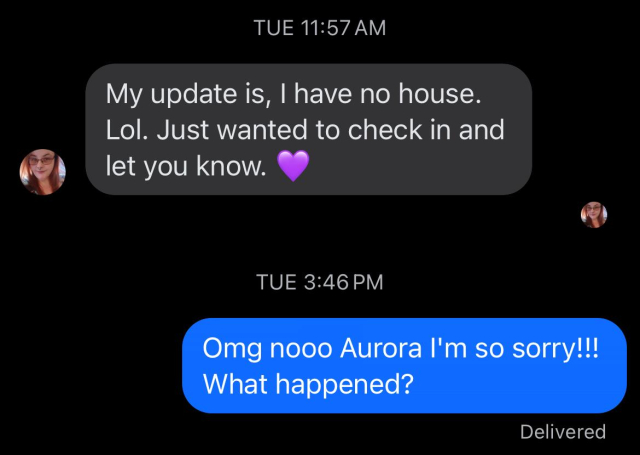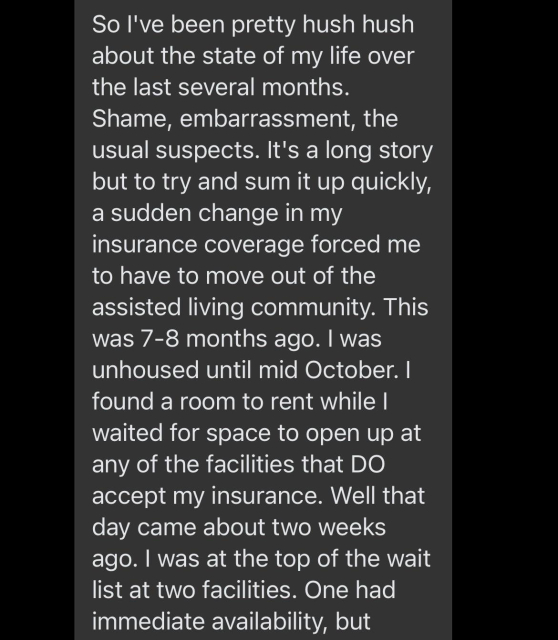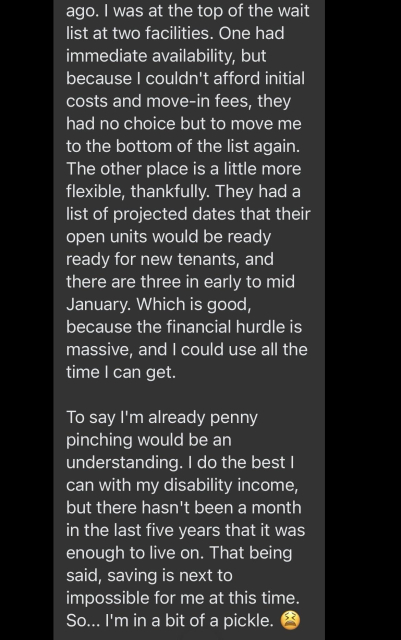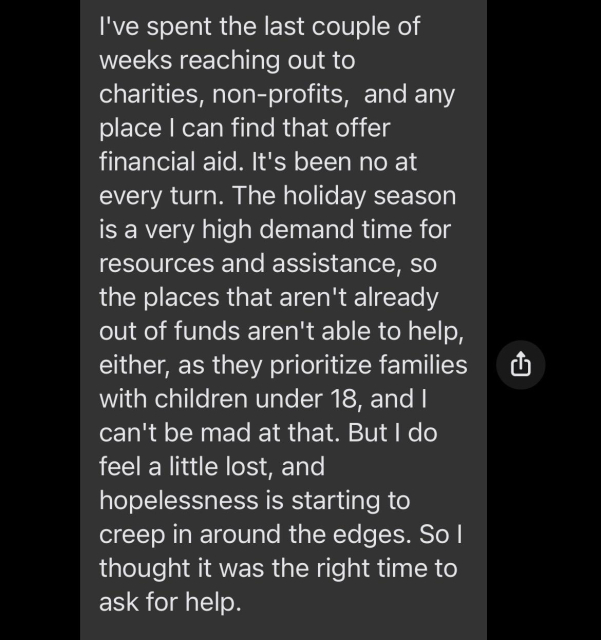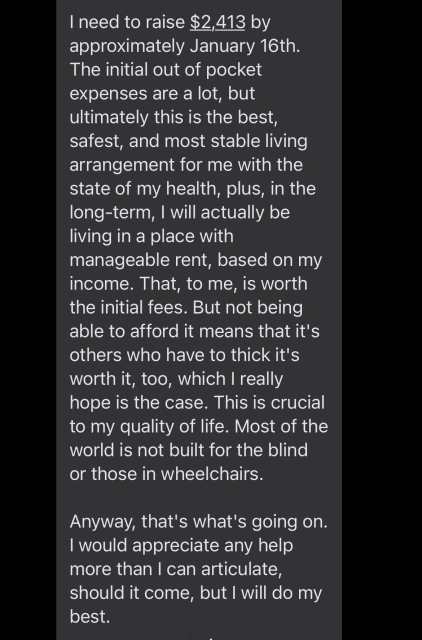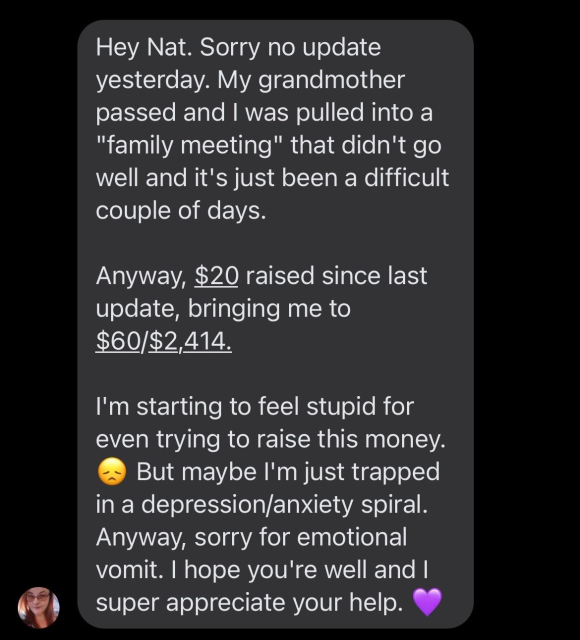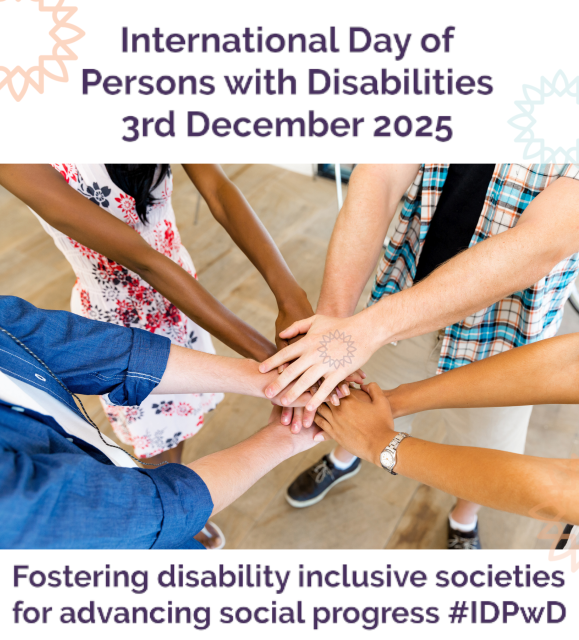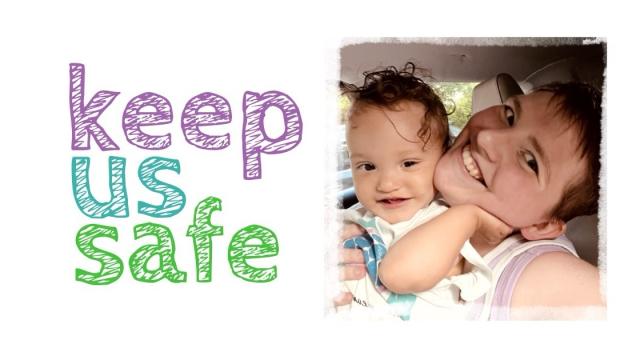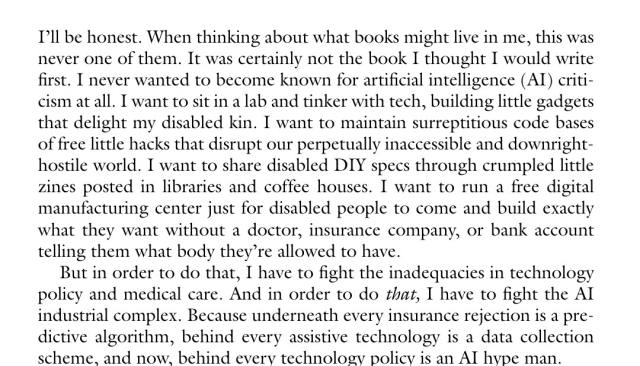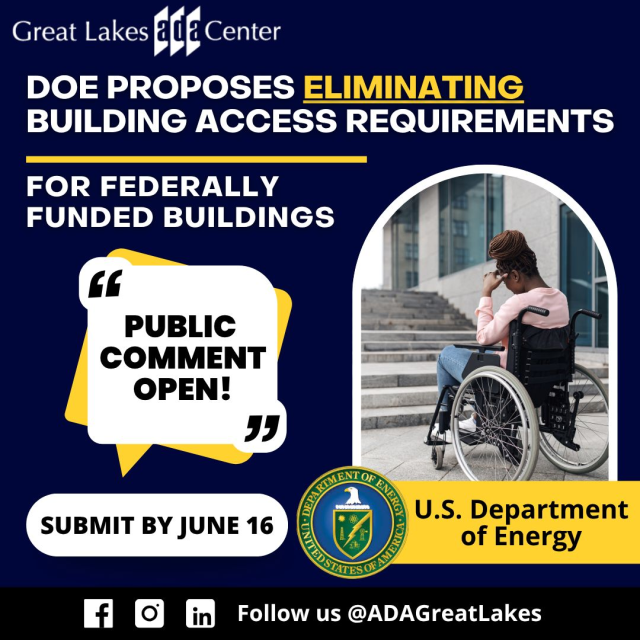Thanks :) 🙏💪 ❤ #disability #neurodivergence #ableism
Search
Items tagged with: Disability
Thanks :) 🙏💪 ❤ #disability #neurodivergence #ableism
I just wanted to say thank you to all the #blind folk who responded last night to give me so many fantastic responses.
It's given me a clear direction of travel, and been quite affirming in terms of my future plans.
I don't have as much money as I'd like, but I can certainly do some things.
I think I'm going to go back to the table and ask the charity to put some of our own money in so that I can do something for Deafblind people.
They may say no.
The measles outbreak in South Carolina is the largest in the country and has spread to three other states.
It’s growing at an alarming speed.
Over 500 people in quarantine and 200 are actively infected.
This was completely preventable.
These people didn’t need to get sick.
Measles can kill. It can disable. It can leave you deaf and blind.
It’s a vaccine preventable illness.
Shame on everyone creating distrust in the vaccine and refusing to do their part for public health.
nbcnews.com/health/health-news…
#uspol #measles #publichealth #disability #ableism
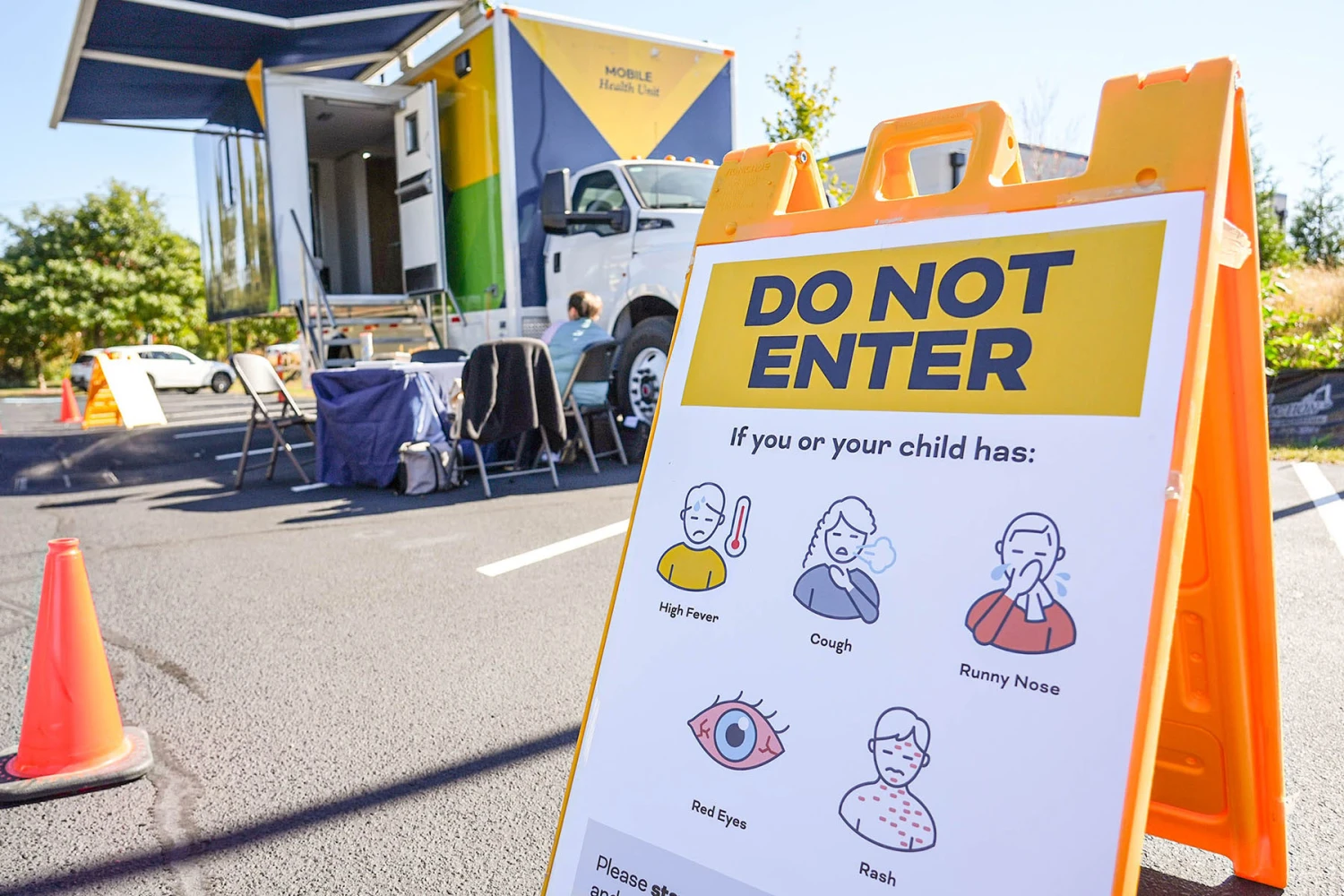
South Carolina measles outbreak doubles within a week: ‘Staring over the edge’
On Friday, South Carolina health department said 124 measles cases were diagnosed since Tuesday, bringing the state total since the outbreak began last fall to 558.Erika Edwards (NBC News)
I just discovered (and tried) this wonderful piece of software
It allows remapping your keyboard in many ways, and it's controlled from a simple configuration file (so, you can prepare one for your disabled friend).
You can, for example, remap the keyboard to only use its right half, if the left hand is dysfunctional (similar to the mirrored keyboard I made, github.com/clackups/qmk_firmwa… ).
Also, it should be useful for #disabledgamers , to map, for example, AWSD to different keys.
#disability #keyboard #accessibility
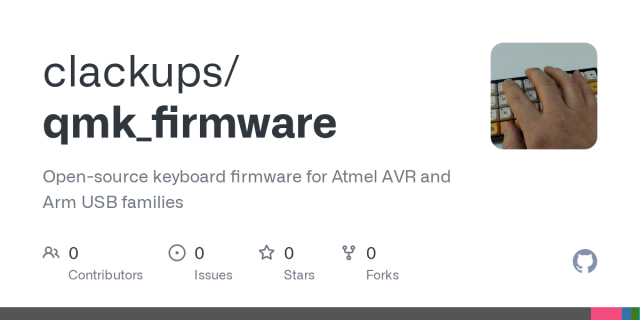
qmk_firmware/keyboards/nuphy/air60_v2/ansi/keymaps/clackups_mirrored/README.md at onehanded_nuphy_air60_v2 · clackups/qmk_firmware
Open-source keyboard firmware for Atmel AVR and Arm USB families - clackups/qmk_firmwareGitHub
Although there won't be any dedicated devroom for #accessibility electronics at #fosdem , nothing prevents us from hooking up in the cafeteria or something. Anyone interested in adaptive technology for the disabled, it will be great to meet you.
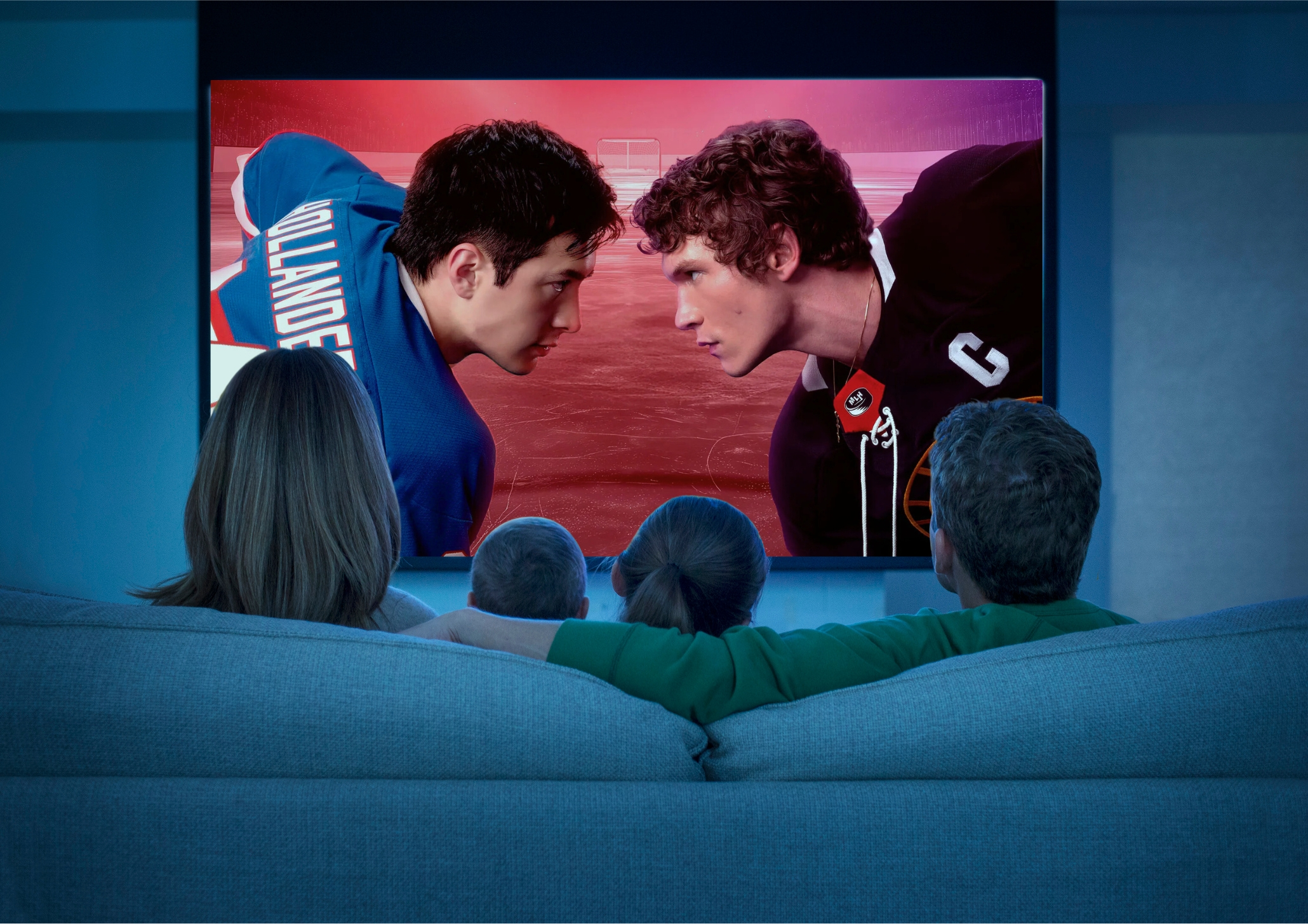
Audio Description Ruins Family Movie Night During Unexpected Sex Scene - The Squeaky Wheel
A recent family movie night at the household of 14-year-old Sarah Mason ended abruptly when the audio description began to vividly relay the details of an unexpected and lengthy sex scene.Sy Hoekstra (The Squeaky Wheel)
URGENT #MUTUALAID UPDATE - 2 weeks left to get disabled friend back into assisted living!!
$2,030 needed by Jan 16 to get a blind wheelchair user back into assisted living after insurance nightmare kicked her out. She's lost out on 2 past opportunities bc she didn't have the money. Please donate what you can & boost often!!
383/2413
PayPal.me/melissarainbow
AuroraEloise on Venmo
$AuroraEloise on CashApp
#disabled #disability #mutualaidrequest #disabilitycrowdfund #disabilitycommunity
#MUTUALAID UPDATE - housing need for blind wheelchair user
Edit: this update was a typo, which happens... all the more easily when you're blind 😅 she meant to say that she had no update, still at $125. Let's make sure she stays housed & safe!!
259/2413
PayPal.me/melissarainbow
AuroraEloise on Venmo
$AuroraEloise on CashApp
#housing #disability #disabilitycrowdfund #disabilitymutualaid #disabled #DisabilityJustice #helpfolkslive2025 #helpfolkslive2026 #mutualaidrequest
#MUTUALAID UPDATE - housing need for blind wheelchair user
Almost 10% of the way to getting a disabled cancer survivor back into assisted living after an insurance nightmare kicked her out!! Please share widely 💞
259/2413
PayPal.me/melissarainbow
AuroraEloise on Venmo
$AuroraEloise on CashApp
#housing #disability #disabilitycrowdfund #disabilitymutualaid #disabled #DisabilityJustice #helpfolkslive2025 #helpfolkslive2026 #mutualaidrequest
We have been remarkably blessed this year, so all I want for hexmas is to get my friend Aurora back into (desperately needed!) assisted living. Aurora is a survivor of cancer, many forms of abuse, and a car accident that broke both legs. She's also blind. And she is far more resilient than any human should ever have to be.
If you have a little extra to share today, can you send it her way? I'd love to help her reach her goal today!!
#MUTUALAID update - urgent housing need for blind wheelchair user
I told Aurora that we've got plenty of time to raise the money, but she's feeling discouraged. Wanna flood her with donations today to show her that anything is possible? ✨
165/2413
PayPal.me/melissarainbow
AuroraEloise on Venmo
$AuroraEloise on CashApp
#disabled #disability #disabilitymutualaid #disabilitycrowdfund #helpfolkslive2025 #helpfolkslive2026 #begpost #disabilityjustice #housing

Zaplaťte uživateli Shane Popplestone pomocí služby PayPal.Me
Přejděte na adresu paypal.me/stickbear2016 a zadejte částku. Protože jde o PayPal, je to jednoduché a bezpečné. Nemáte účet PayPal? Nevadí.PayPal.Me
People think disability is something you can “try harder” your way out of.
They think it’ll never happen to them, or if it does they will overcome.
They refuse to listen to disabled voices.
They refuse to help build better safety nets.
They refuse to care.
It’s a minority group you can join anytime

Zaplaťte uživateli Shane Popplestone pomocí služby PayPal.Me
Přejděte na adresu paypal.me/stickbear2016 a zadejte částku. Protože jde o PayPal, je to jednoduché a bezpečné. Nemáte účet PayPal? Nevadí.PayPal.Me

Zaplaťte uživateli Shane Popplestone pomocí služby PayPal.Me
Přejděte na adresu paypal.me/stickbear2016 a zadejte částku. Protože jde o PayPal, je to jednoduché a bezpečné. Nemáte účet PayPal? Nevadí.PayPal.Me
#MUTUALAID update - no donations yet
With 36 days to go, we can get Aurora back into assisted living with just $67/day from now thru Jan 16!!
0/2413
PayPal.me/melissarainbow
AuroraEloise on Venmo
$AuroraEloise on CashApp
#disabled #disability #disabilitymutualaid #disabilitycrowdfund #helpfolkslive2025 #helpfolkslive2026 #begpost #disabilityjustice #housing
#MUTUALAID - urgent housing need for blind wheelchair user
Aurora has been going thru a LOT and she didn't want to bother me to ask me to post here. She was kicked out of assisted living and needs $2,413 by Jan 16 to get safe housing again.
0/2413
PayPal.me/melissarainbow
AuroraEloise on Venmo
$AuroraEloise on CashApp
#disabled #disability #disabilitymutualaid #disabilitycrowdfund #helpfolkslive2025 #helpfolkslive2026 #begpost #disabilityjustice #housing
Good morning, all. How is everyone?
Well, I’m officially 34 today. I wound up crashing hard for most of the night, but the good news is that this morning I feel pretty good — aside from the usual arthritis pain in my feet and hands and not being able to find one of my slippers, so I’ve had to walk on the hard floor barefoot. Lol. I’ve looked everywhere, so I’ll probably have to ask my mom for help when she gets up.
I ordered both compression gloves and socks, but my socks won’t be here until December 6th, and my gloves won’t come in until the 12th.
#GoodMorning #Birthday #Turning34 #ChronicIllness #Arthritis #Disability #Blind #Accessibility #PainAwareness #CompressionGloves #CompressionSocks
Happy International Day of Persons with Disabilities!
This year's #IDPwD theme is: "Fostering #disability #inclusive societies for advancing social progress"
What better way than ensuring everyone has access to, and awareness of #Accessibility of technology.
* #NVDA is FREE for anyone
* Right now, get 10% off certification to show your skills (& cheap training materials to get you to that point)
un.org/en/observances/day-of-p…
#DisabilityAwareness #Inclusion #IDPwD2025 #NVDA #Accessibility
International Day of Persons with Disabilities | United Nations
The International Day of Disabled Persons aims to promote the rights and well-being of persons with disabilities in all spheres of society and development.United Nations
Hey lovelies 
We'd like to ask you all for your thoughts, suggestions, and ideas to help us resolve an ongoing issue.
The issue
At a high-level, we are a neurodivergent (AuDHD) spoonie with a mixture of health issues that are preventing us from being able to get or do a "typical" job and earn an income.
By "typical" job, we mean one where the company and role just aren't well-suited to many folks who are disabled (including being neurodivergent), have support needs, and/or have other health issues.
Most "typical" jobs broadly:
- Have fixed hours (start/finish times and total working hours required).
- Require a minimum fixed amount of time in a physical office.
- Require a lot of interaction with other people (including colleagues).
... and so on, so you can probably understand how difficult it is for us to find any suitable paid employment that we can do 😅
This is made harder by the fact that:
- We only know how to search for "typical" jobs.
- There is zero support within the UK for finding suitable employment outside of "typical" jobs.
- The welfare system within the UK is fundamentally (and intentionally) broken
The request
We have zero idea where to even start, so we are genuinely asking for your input and recommendations here.
We have decent reading comprehension, writing ability, and neurospicy pattern recognition, but we also have an inconsistent level of executive function and energy (physical and mental), so we can't do a job where we have to clock in and out at set times, even on a part-time basis.
Even whilst writing this post, we're already out of spoons and on to knives today, meaning that we're pushing through to ask for help.
Any suggestions will be appreciated, and we'll add additional details to the post based on any questions or thoughts from others 🥺🫶
Thank you in advance for your thoughts, as well as your empathy, understanding, and kindness 
#AskFedi #GenuinelyAsking #GetFediHired #neurodivergent #neurospicy #AuDHD #ActuallyAutistic #ADHD #spoonie #disability #disabled #LateStageCapitalismSucks
update: need met!!
No donations yet. A neighbor gave Aurora a few packets of oatmeal & a blanket. She needs $45 for the space heater, and a week's worth of food to tide her over until her SNAP refills.
Please give if you can!!
PayPal.me/melissarainbow
AuroraEloise on Venmo
$AuroraEloise on CashApp
#mutualaid
#MutualAidRequest
#helpfolkslive2025
#disabledmutualaid
#crowdfund
#disability
#disabled
#crowdfunding
It’s incredible how often sighted people offering completely unsolicited help lead me astray. Took my daughter to a ballet lesson this morning and looked up a coffee shop to wait for her in. I’m walking up the block where I know the shop is, and smell coffee, so I turn to see if I can find the door. Right then, a sighted person stops me asking if I need help. I say I’m looking for the coffee shop on this block, and he says I’m close, but a couple doors away. So I think maybe the smell isn’t coming directly from the door and he must see what I’m talking about, right? Right??? He knows better because he can see, of course. He takes me to the door he thinks is what I’m looking for, and we say goodbye. I go inside, and immediately smell food, not coffee, and hear way too much silverware clinking on plates for a coffee shop. A woman greets me, and I say “I’m looking for the coffee shop on this block. I’m not there, am I?” “No, this is a diner,” she says. So I go back outside, walk back to where I was before, smell the coffee again, and walk right through the shop’s door no problem.
What good are eyes if you don’t know how to use them? #Blind #Blindness #disability
More people have died in ICE custody in last 9 months than in the entire prior 4 years.
We hear of a few, but most barely make the news.
Cases like Randall Alberto Gamboa Esquivel.
He was in perfect health when ICE detained him.
He disappeared in June & by August was in a vegetative state.
ICE deported him anyways.
They literally put a man who was at death’s door on a plane to Costa Rica.
Doctors there found he had encephalopathy, rhabdomyolysis and the inability to eat on his own.
What happened to him in ICE custody to cause this?
He died a few weeks after deportation:
ICE enforcement may be a mass disabling event.
Disease is rampant in the camps.
Disabled people report having their medical needs ignored and their conditions drastically worsened.
The indiscriminate use of chemical weapons and violence causes harm.
Abolish ICE.
theguardian.com/us-news/2025/n…
#disability #uspol #fascism #ice #abolishice #eugenics
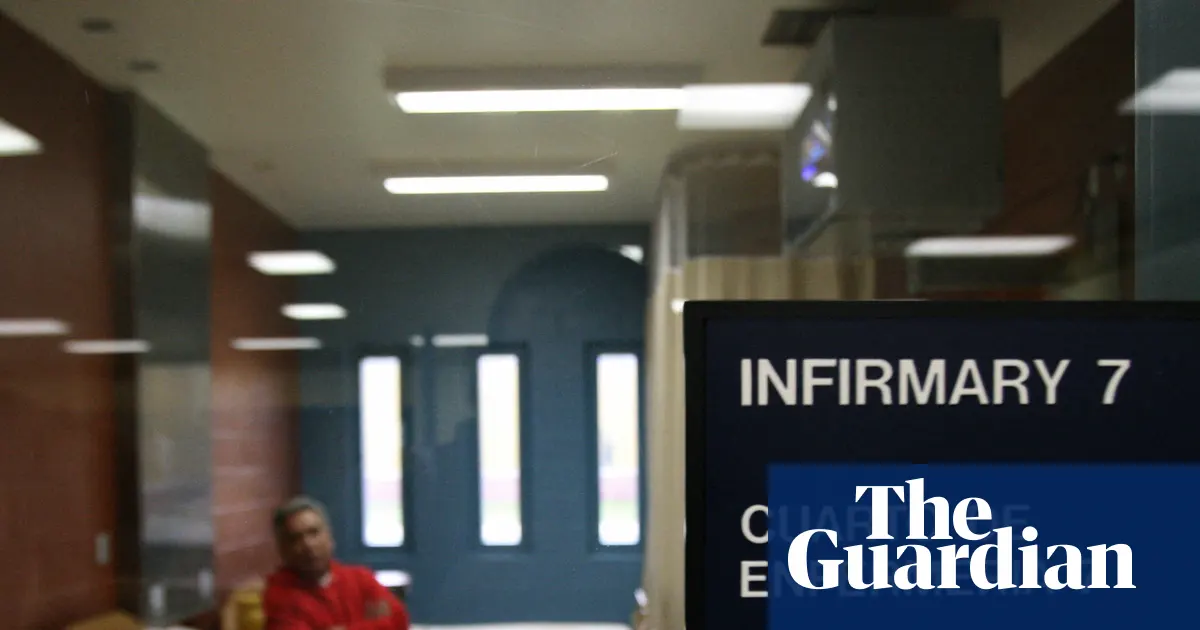
Family speaks out after death of man deported by ICE in vegetative state
Randall Alberto Gamboa Esquivel’s family alleges negligence and inhumane treatmentRamon Antonio Vargas (The Guardian)

Zaplaťte uživateli Shane Popplestone pomocí služby PayPal.Me
Přejděte na adresu paypal.me/stickbear2016 a zadejte částku. Protože jde o PayPal, je to jednoduché a bezpečné. Nemáte účet PayPal? Nevadí.PayPal.Me
#Mastodon, yesterday there was an influx of support on #IndigenousPeoplesDay for #SabiLewSounds & family
That support abruptly stopped last night, as the day came to a close
Please don't reserve support of the needs & pleas of those who are #Indigenous to a single day
#Society is built upon their oppression & that of their ancestors
#Fascism continues to target them as dangers of #ICE & being predisposed to #Poverty & #Disability continues
URGENT #MUTUALAID
No donations yet this week 💔 DV survivor & toddler in need of help with legal fees (due every 2 weeks), housing, & more—about to hit the SNAP cliff w the shutdown.
Goal is $6k by Nov 14 💕
0/6000
chuffed.org/project/replace-ou…
paypal.me/natoleander
venmo/cashapp natsmith89
#transmutualaid #lgbtq #genderfluid #queer #queermutualaid #disability #disabilitycrowdfund #disabledmutualaid #soloparent #snap #helpfolkslive2025 #help #begpost #transinneed #family #poverty

Chris McCausland on Would I Lie to You?
Chris McCausland: “I thought my neighbour was ignoring me, and he thought I was ignoring him, until he found out I was blind, and I found out he was deaf.” ...YouTube
I forgot that I did eventually edit the first line of the book. It was originally, "I did not want to write this book."
Disabling Intelligences eBook is available now link.springer.com/book/10.1007…
Image text : I’ll be honest. When thinking about what books might live in me, this was never one of them. It was certainly not the book I thought I would write first. I never wanted to become known for artificial intelligence (AI) criticism at all. I want to sit in a lab and tinker with tech, building little gadgets that delight my disabled kin. I want to maintain surreptitious code bases of free little hacks that disrupt our perpetually inaccessible and downright-hostile world. I want to share disabled DIY specs through crumpled little zines posted in libraries and coffee houses. I want to run a free digital manufacturing center just for disabled people to come and build exactly what they want without a doctor, insurance company, or bank account telling them what body they’re allowed to have.
But in order to do that, I have to fight the inadequacies in technology policy and medical care. And in order to do that, I have to fight the AI industrial complex. Because underneath every insurance rejection is a predictive algorithm, behind every assistive technology is a data collection scheme, and now, behind every technology policy is an AI hype man.
#AI #AIhype #Disability #eugenics #metaeugenics
Disabling Intelligences
This book discusses the influences of eugenics on the AI industry and the impacts of AI opportunism on disabled people.SpringerLink
Remember that white house executive order against DEIA, “diversity, equity, inclusion, and accessibility”?
They went out of their way to add the A for accessibility. So this is very sad but not surprising.
"Trump administration cuts funding to Oregon disability programs"
opb.org/article/2025/09/11/tru…
"Organizations across Oregon received notice from the U.S. Department of Education that they’d lose hundreds of thousands of dollars"
#Oregon #Disability #Accessibility #DisabilityJustice #Education
Trump administration cuts funding to Oregon disability programs
Organizations across Oregon received notice from the U.S. Department of Education that they’d lose hundreds of thousands of dollars.Bryce Dole | Kathryn Styer Martínez (OPB)
BudgetBraillerBlog: BudgetBraillerBlog Intro. “A manual brailler costs a little under $1,000 and electric braillers cost significantly more. Given that I was just at a 3D printing festival and you can build a 3D printer for under $200, I decided to try to design one.”
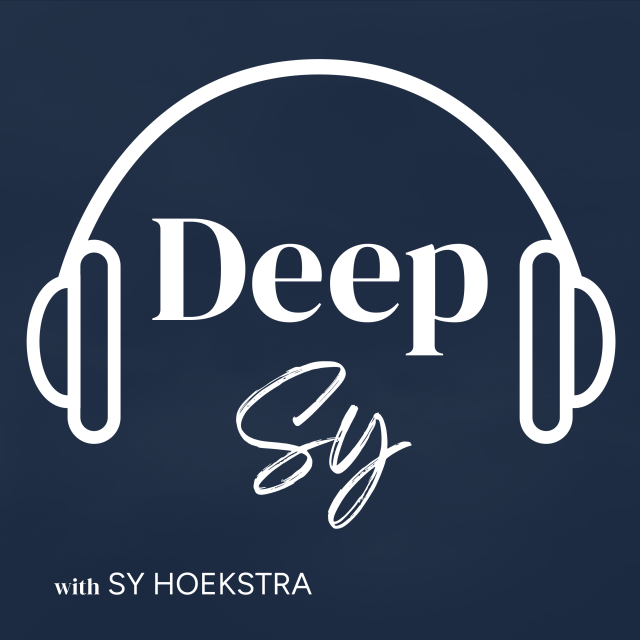
Have You Ever Imagined What It's Like to Be Blind? ... Please Don't
A trailer for my new podcast!Sy Hoekstra (Deep Sy)
🇨🇦 Canadians prefer the disabled and poverty stricken pushed out of sight-- invisible
Punishing unhoused people for existing doesn’t make them go away
#Canpoli #Canada #Poverty #Housing #MentalHealth #Disability #invisible
policyalternatives.ca/news-res…

Encampment sweeps won’t solve Canada’s homeless crisis | CCPA
Devin’s headlamp cut through the darkness. At the base of the pine trees lining the narrow green strip beside Notre Dame East Boulevard, he was bent, writing on the white backside of a plastic sheet.Changiz M. Varzi (CCPA)
From the Disability Visibility Project:
"Immigrant Rights Are Disability Rights"
disabilityvisibilityproject.co…
"… a true commitment to justice for disabled people must recognize that many undocumented immigrants are themselves disabled and deserving of basic rights, not total erasure from the disability rights discourse."
#USPol #Disability #DisabilityRights #Ableism #Immigration #HumanRights

Immigrant Rights Are Disability Rights
Immigrant Rights Are Disability Rights Joe Stramondo In 2019, a White disability rights leader with a national reputation, Bruce Darling, had a spectacular fall from grace because of commen…Disability Visibility Project
We need urgent community action to stop this incredibly ableist plan from moving forward.
The DOE has ruled that new federal buildings don’t have to meet accessibility standards.
That will mean many disabled people won’t be able to work in or access these places.
They’re literally excluding us from as many facets of life as possible, because they have a eugenics plan.
Call, email, speak out!
Accessibility is not a “nice to have”. It’s a legal right. It’s necessary for our survival.
federalregister.gov/documents/…
#uspol #fascism #disability #chronicillness #ableism #accessibility #doe
Apparently the Department of Energy is trying to eliminate accessibility/nondiscrimination regulations. If you live in the U.S., please take a few minutes to comment on DOE-HQ-2025-0015 and DOE-HQ-2025-0024:
regulations.gov/document/DOE-H…
regulations.gov/document/DOE-H…

